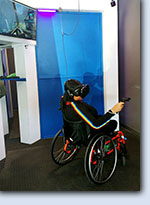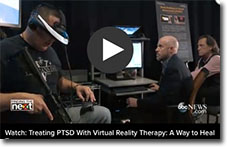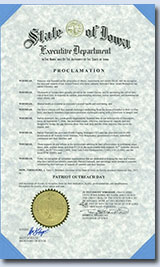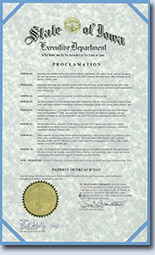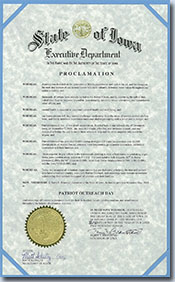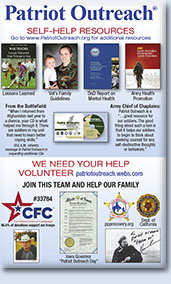| Patriot Outreach Supporting our Armed Forces, Retirees, Veterans, Government Civilians, Battlefield Contractors, First Responders and their Families (Patriots) |
| Home | My Story | Programs | What's Happening | About Stress & PTSD | News & Reports | Donate | Mission | Contact |
|
|||||
Our Coping Strategies, including BraveMind (an interactive, immersive virtual reality system, utilizing exposure therapy, the most effective evidence-based approached for PTSD), and STRIVE under Battlefield Conditions (gaining experience in simulations), are effective tools to engage our “Resilient Warrior.” We teamed with OmniLifeVR, a leading Virtual Reality testbed in Mental Health, runs “Disciples of Gaming” (7,500+ players worldwide), and community outreach utilizing proprietary protocols to combat stress, suicide, and even PTSD. |
|||||
BRAVEMIND Showcased at 'Dell Technologies World' |
|||||
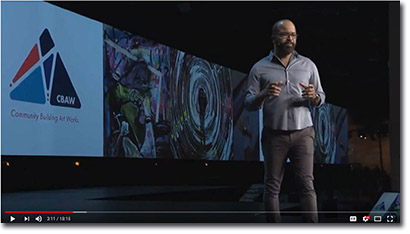 |
|||||
| BRAVEMIND Post Traumatic Stress exposure therapy system is introduced at the Dell Technologies World Event. Michael Dell introduces Skip Rizzo and Jeffery Wright (Bernard from Westworld) who discuss BRAVEMIND and their work supporting Veterans. | |||||
Virtual Reality Therapy and Prevention: |
|||||
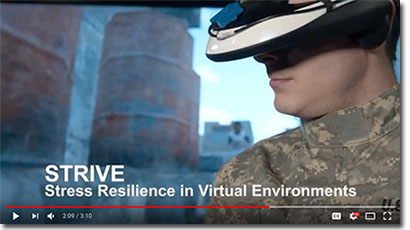 |
|||||
| Dr. "Skip" Rizzo PHD Introduces Bravemind and STRIVE, two virtual reality approaches to preventing and treating Post-Traumatic Stress in Our Warriors and Veterans. Developed at the USC Institute for Creative Technologies. BRAVEMIND, a virtual reality exposure therapy and STRIVE, for pre-deployment resilience training. | |||||
|
|||||
TEDx - Dr. Skip Rizzo: "How Virtual Reality is Helping Soldiers Recover From War" |
|||||
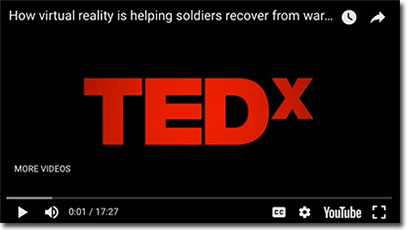 |
|||||
| A 'must watch' video about how we can to do more to support Our Warriors and Veterans. Professor Skip Rizzo shares new applications for virtual reality, once thought to be a technology for the entertainment industry. Experience "BraveMind" and meet a "Sim Coach," Virtual Reality tools to help Our Warriors and Veterans recover from war. | |||||
Articles and News Reports: |
|||||
ABC News Special: 'Treating PTSD With Virtual Reality Therapy: A Way to Heal Trauma' |
|||||
| Improving Lives Through Virtual Reality Therapy - American Psychological Association Advancements in virtual reality technology have not only led to improved experiences for people who enjoy video games but they are also treating very serious psychological and physical disabilities. In this episode, psychologist Albert “Skip” Rizzo, PhD, discusses research into the effectiveness of virtual reality therapy and how this technology can improve the therapist-client relationship. APA 'Speaking of Psychology' episode# 13: “Skip” Rizzo, PhD, discusses research into the effectiveness of virtual reality therapy and how this technology can improve the therapist-client relationship: Mp3 |
|||||
| VR Systems Help Treat Veterans Recovering From PTSD - Bloomberg Albert “Skip” Rizzo, a clinical psychologist, Director of Medical Virtual Reality and owner of one of the coolest job titles you never knew existed until now. His goal in life is to drag the field of psychology, "kickin' and screamin' into the 21st Century." |
|||||
| How Virtual Reality Declared War On PTSD - GIZMODO Albert “Skip” Rizzo, a clinical psychologist, Director of Medical Virtual Reality and owner of one of the coolest job titles you never knew existed until now. His goal in life is to drag the field of psychology, "kickin' and screamin' into the 21st Century." Even before new technology saved virtual reality from the unfortunate pigeonhole of being 'just a gimmick', Skip was convinced of its ability to improve the way that multiple conditions — PTSD first and foremost amongst them. |
|||||
| VR Brings Dramatic Change To Mental Health Care - Forbes Today, Bravemind is sophisticated enough to insert minute details of a PSTD patient's inciting incident. How many people are in the vehicle? Where are they sitting? What kind of road are they on? What time of day is it? Or are they on foot in a bazaar? Is it crowded with civilians? Are there vehicles present? Civilians? Helicopters overhead? All these details can be added to the simulation. The operator can play the scene forward and back, slow it down, or freeze the frame, all reflecting the patient's narration. The Army is currently spending two million dollars on a 70-site clinical research trial of Bravemind. |
|||||
| Bravemind: Using Virtual Reality to Treat PTSD Harvard Business School Treatment for PTSD has varied over the years, from medication to psychotherapy to simple exercise. Most now agree that exposure therapy, a treatment pioneered in the 1950s that seeks to relive a sufferer’s trauma in a controlled, often imaginary environment, is usually the most effective prescription. The idea is to take a patient back to the memory of their trauma over and over again until their triggers no longer produce anxiety. Psychiatrists call this process habituation. Through repetition, the memory is slowly robbed of its power. |
|||||
| How Virtual Reality Is Helping Heal Soldiers With PTSD - NBC NEWS Treatment for PTSD has varied over the years, from medication to psychotherapy to simple exercise. Most now agree that exposure therapy, a treatment pioneered in the 1950s that seeks to relive a sufferer’s trauma in a controlled, often imaginary environment, is usually the most effective prescription. The idea is to take a patient back to the memory of their trauma over and over again until their triggers no longer produce anxiety. Psychiatrists call this process habituation. Through repetition, the memory is slowly robbed of its power. |
|||||
| TEDx Talk: How virtual reality is helping soldiers recover from war At TEDxManhattanBeach, Rizzo explains how Bravemind works and how clinicians can use it to help Veterans with PTSD. When Bravemind is used with patients, clinicians modify the application to fit each patient’s needs, he says, allowing Veterans to confront specific traumatic memories “in a safe and supportive environment.” In a 2010 study of the efficacy of Bravemind to treat PSTD, Rizzo and colleagues found that out of 20 Veterans diagnosed with PSTD before using Bravemind, 16 no longer met the American Psychiatric Association’s criteria for PTSD after treatment with the software. |
|||||
| USC’s BRAVEMIND gives OC Fair attendees firsthand look at how VR can help with PTSD - USC News Putting on a brave face and pushing these memories to the back of their minds is a common coping mechanism. But USC psychologist Albert “Skip” Rizzo finds that reliving those memories with the help of virtual reality can help. While it’s been available to service members across the U.S. via clinicians at Veterans Affairs facilities or university clinics, it’s now available for the public to experience. |
|||||
Overview: USC Institute for Creative Technologies: |
|||||
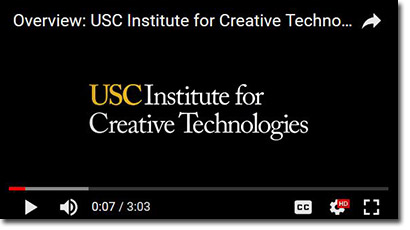 |
|||||
| Introduction to how the University of Southern California's Institute for Creative Technologies (USC-ICT) is working with the Army Research Lab (ARL) to combine world class academic research with the magic of movies and the engagement of video games to revolutionize the way we teach, train, heal and help. | |||||
'OmniLife Virtual Reality Outreach' is helping Veterans suffering from dementia and stroke to relive joyful memories, regenerate neuronal connections and improve brain pliability: |
|||||
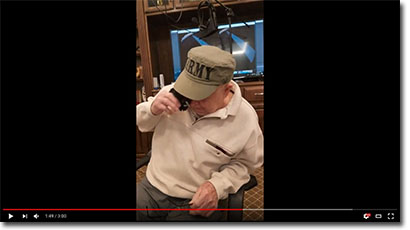 |
|||||
| A U.S. Army Korean War Veteran combating Dementia experiences tears of joy after he relives and recalls his life, and a stroke patient enjoins a Virtual Reality therapy session. Research is showing that Immersive Virtual Reality therapy sessions can improve cogitative function and well-being of those experiencing Dementia, Alzheimer's or dealing with brain injury. Stimulating Formation of New Neural Connections in the Adult Brain - Science News Scientists Reveal How The Brain Can Enhance Connections - MIT News Mental Stimulation, Neural Plasticity, and Aging - Neuroscience Nursing |
|||||
Hero's Hall at OC Event & Fair Center: |
|||||
| A place for the public to gather, learn and celebrate Veterans | |||||
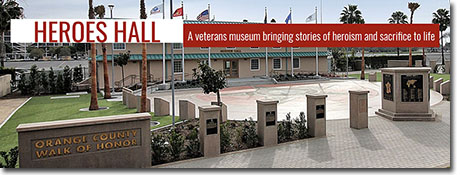 |
|||||
Bravemind Exhibit:
|
|||||
| Hero's Hall is a free, permanent, year-round museum and education center with exhibitions, performances and educational programs that celebrate the legacy of our Veterans and others who have served our nation. Soldiers may never forget what it’s like, but it’s not always easy to describe. With the virtual reality technology of Bravemind, you can see what they’ve seen, feel what they’ve felt, and fear what they’ve feared – all within the safe confines of an exhibition at Heroes Hall using VR to not only immerse visitors into the world of the soldier at war, but to help those in need. Experience this fascinating and eye-opening exhibition first-hand, and learn about how Bravemind has become a valuable resource for helping our military and veterans. |
|||||
 |
|||||
| If you have a GearVR Headset with a Galaxy 8 phone, or an Oculus Go HMD, here is a link to where you can download the 6minute experience to install and try it yourself (note: it is about 3 gigs in size): https://webdisk.ict.usc.edu/index.php/s/V477ltUpR5nXF8f/authenticate Password is: BRV360Final621 |
|||||
| Bravemind at Heroes Hall - KTLA TV News videos | |||||
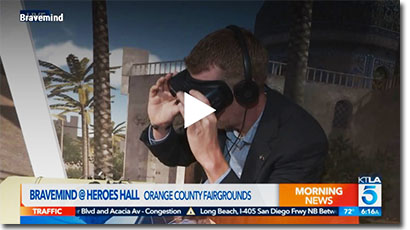 |
|||||
|
|
|||||
|
|||||
 |
|||||
| Bravemind Resources & Info. | |
| Virtual Reality Applications to Address the Wounds of War | |
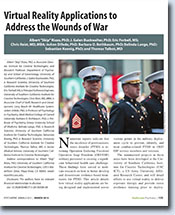 |
|
| Bravemind - Virtual Reality Exposure Therapy Brief: | |
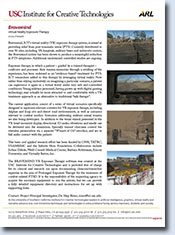 |
|
| Is Clinical Virtual Reality Ready for Primetime? Neuropsychology Journal: |
|
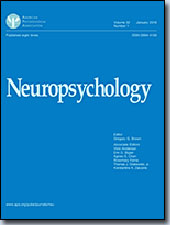 |
|
| Clinical Virtual Reality Tools to Advance the Prevention, Assessment, and Treatment of PTSD European Journal of Psychotraumatology | |
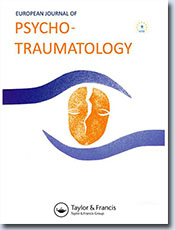 |
|
| Online Video Library Directory MedVR Research Group USC Institute for Creative Technologies: |
|
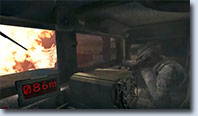 |
|
| OMNILIFE VR Technologies - VR technology that transforms lives into Magical Immerse Experiences. |
|
 |
|
| Dr. Albert "Skip" Rizzo Bio: | |
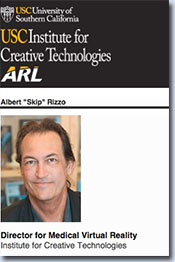 |
|
Development and Early Evaluation
of Virtual Iraq/Afghanistan Exposure Therapy System for Combat-related PTSD - New York Acadmey of Sciences |
|
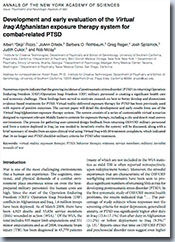 |
|
| Support | |
 LifeLine Resources LifeLine ResourcesBest Online Support |
|
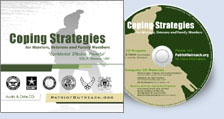 Coping StrategiesTM A special Multi-Media CD - an off-line version of the Patriot Outreach website |
|
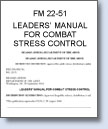 FM 22-51 FM 22-51 Leaders' Manual for Combat Stress Control |
|
| Patriot Outreach Initiatives | |
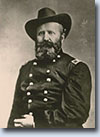 |
General Hays Veterans Memorial Honor Our Heroes! Memorial of the “High Plains” will honor Veterans from Northwest Kansas and Fort Hays. |
|
|
| Patriot Outreach Proclamations | |
Senate Majority and Minority Leaders passes Patriot Outreach “Certificate of Recognition: |
|
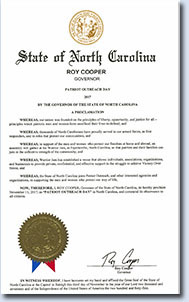 |
|
| Mayor (R) of Fayetteville (Ft. Bragg) Proclaims "Veterans Day" "Patriot Outreach Day" 2017: |
|
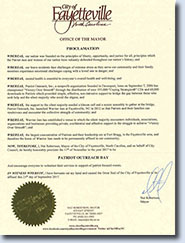 |
|
| Be a Volunteer! Join The Team! | |
 |
|
| Review our Volunteer Orientation Video |
|
| "Memorial Day" Proclamations | |
|
|
Serving from 2006
Patriot Outreach
100 East Kansas Street, Ste. 143 Lansing, Kansas 66043
Call Toll Free: 1-866-96-STRONG (866-967-8766) (8am to 4pm Pacific time) - Email: info@PatriotOutreach.org
Copyright 2006-2021 Patriot Outreach
